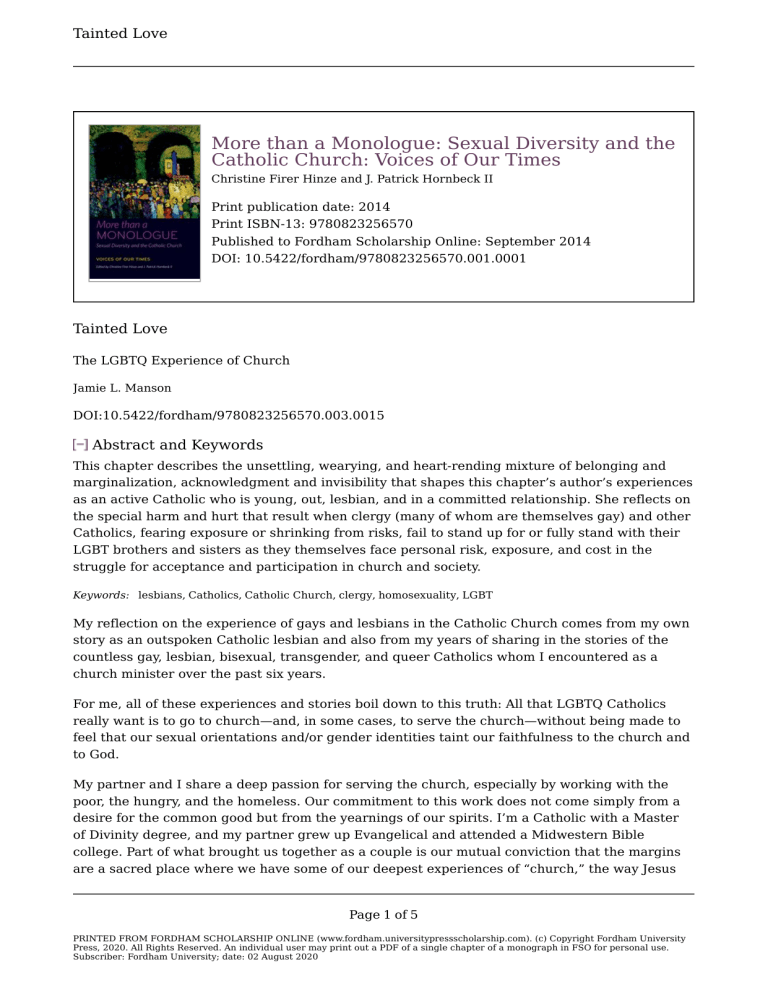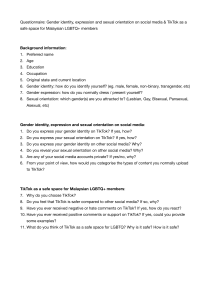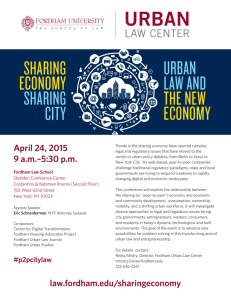
Tainted Love More than a Monologue: Sexual Diversity and the Catholic Church: Voices of Our Times Christine Firer Hinze and J. Patrick Hornbeck II Print publication date: 2014 Print ISBN-13: 9780823256570 Published to Fordham Scholarship Online: September 2014 DOI: 10.5422/fordham/9780823256570.001.0001 Tainted Love The LGBTQ Experience of Church Jamie L. Manson DOI:10.5422/fordham/9780823256570.003.0015 Abstract and Keywords This chapter describes the unsettling, wearying, and heart-rending mixture of belonging and marginalization, acknowledgment and invisibility that shapes this chapter’s author’s experiences as an active Catholic who is young, out, lesbian, and in a committed relationship. She reflects on the special harm and hurt that result when clergy (many of whom are themselves gay) and other Catholics, fearing exposure or shrinking from risks, fail to stand up for or fully stand with their LGBT brothers and sisters as they themselves face personal risk, exposure, and cost in the struggle for acceptance and participation in church and society. Keywords: lesbians, Catholics, Catholic Church, clergy, homosexuality, LGBT My reflection on the experience of gays and lesbians in the Catholic Church comes from my own story as an outspoken Catholic lesbian and also from my years of sharing in the stories of the countless gay, lesbian, bisexual, transgender, and queer Catholics whom I encountered as a church minister over the past six years. For me, all of these experiences and stories boil down to this truth: All that LGBTQ Catholics really want is to go to church—and, in some cases, to serve the church—without being made to feel that our sexual orientations and/or gender identities taint our faithfulness to the church and to God. My partner and I share a deep passion for serving the church, especially by working with the poor, the hungry, and the homeless. Our commitment to this work does not come simply from a desire for the common good but from the yearnings of our spirits. I’m a Catholic with a Master of Divinity degree, and my partner grew up Evangelical and attended a Midwestern Bible college. Part of what brought us together as a couple is our mutual conviction that the margins are a sacred place where we have some of our deepest experiences of “church,” the way Jesus Page 1 of 5 PRINTED FROM FORDHAM SCHOLARSHIP ONLINE (www.fordham.universitypressscholarship.com). (c) Copyright Fordham University Press, 2020. All Rights Reserved. An individual user may print out a PDF of a single chapter of a monograph in FSO for personal use. Subscriber: Fordham University; date: 02 August 2020 Tainted Love envisions and incarnates it in the Gospels. It is in the face of the broken and desolate that we most clearly see the face of Christ. Yet, because we’re in a same-sex relationship—as opposed to remaining celibate, as Catholic and Evangelical beliefs would have it—we walk into most churches and church-related activities with deep trepidation. We look around the room to see if we can locate any congregants who appear to be gay and not out of place. We know to avoid holding hands during prayers unless we feel confident that it is a safe space. We know not to be immediately forthcoming about our relationship if someone talks to us after the service. (p.151) Of course, we are blessed to live in the New York City area, where there are a number of LGBTQ-friendly churches from which to choose. But we live in a bubble. And a visit to my partner’s family in western Michigan is enough to make that bubble burst. Because of their Evangelical beliefs, it wasn’t until two years into our relationship that my partner’s family was even willing to meet me. When we were finally introduced, I was blessed that their desire to show good, old-fashioned Midwestern hospitality seemed to supersede their religious convictions about our “lifestyle choice.” But the Midwestern welcome often screeches to a halt when we attend Sunday services with them, where I am typically introduced as my partner’s roommate. After every service we attend with her family, we often breathe a sigh of relief that no antigay remarks were made at any point during worship. Our luck ran out, unfortunately, during one Father’s Day weekend. The preacher decided to dedicate his forty-five-minute sermon to Galatians 5, where Paul offers his litany of sins that can keep a Christian from “inheriting the kingdom.” Paul mentions fifteen kinds of transgressions, ranging from witchcraft and rage to idolatry and drunkenness. Yet this pastor decided to spend more than half of his sermon fixated on Paul’s mention of the sin of “sexual immorality.” And he zeroed in on one particular form of sexual immorality: homosexuality. He explained to the congregation that, in the original Greek, Paul used the word porneia to describe sexual immorality. Then he explained that while porneia covered a multitude of sexual sins and sounded more a lot like “pornography,” it most aptly described homosexuality. Why? Because, like pornographers who objectify those they film, homosexuals objectify their lovers by going against “the laws of nature.” Therefore all of those who give into this kind of sexual immorality have “written off Christ” and “would never inherit the kingdom.” Near the end of the sermon, the pastor mentioned briefly that Paul follows his list of sins in Galatians with a list of what he calls the “fruits of the Spirit.” Here Paul tells us that love, joy, peace, forbearance, kindness, goodness, faithfulness, gentleness, and self-control are all the manifestations of those who “belong to Christ Jesus.” According to this pastor, these gifts are only available to those in a married relationship between one man and one woman. (p.152) Like good Evangelicals with deep Dutch Calvinist roots, my partner’s parents never brought up the sermon to either of us. But my partner and I were, in a strange way, glad that we were present in that church for that particular sermon. It forced her parents, for the first time in their lives, to listen to an antigay sermon while sitting next to a loving same-sex couple deeply committed to doing the work of the church. Page 2 of 5 PRINTED FROM FORDHAM SCHOLARSHIP ONLINE (www.fordham.universitypressscholarship.com). (c) Copyright Fordham University Press, 2020. All Rights Reserved. An individual user may print out a PDF of a single chapter of a monograph in FSO for personal use. Subscriber: Fordham University; date: 02 August 2020 Tainted Love What we wish we could have told them and this pastor, however, is about the ways in which our relationship has brought the fruits of the Spirit more fully into our lives. Rather than separating us from Jesus, the joy and peace that we bring to each other’s life has actually helped us participate more fully in the very life of God. And, in fact, those fruits have also made us much more fruitful within our own community by helping us grow in generosity and in our willingness to take greater risks in loving others. The experience drove home for us once again this painful truth: regardless of what good work we do for the church, we know that many church people will see our efforts as tainted because of our same-sex relationship. The members of my partner’s home church, for instance, are extremely proud of the work that she is doing with the poor in New York City. However, if they knew she was in a relationship with a woman, they would cease to talk about her so proudly. (They might gossip, of course!) All of her good work would be somehow less valid in their eyes. Like my partner, I have had similar experiences of feeling that my sexual orientation taints my work in the church. As a columnist, I do sometimes write about gay and lesbian issues. But more often I write about the spiritual hunger of young adult Catholics in the church. My essays on this theme have led several editors from religious presses to invite me to write books on this topic. Unfortunately, once these editors learned that I am openly lesbian, they rescinded their invitations. I have been disinvited from many speaking engagements for the same reason. Though my insights into non-LGBT religious issues are appreciated, my voice somehow loses credibility or becomes less desirable by my being openly lesbian. Of course, my story and my partner’s stories are just a few of the countless narratives of suffering, shame, and isolation caused by the anti-LGBTQ rhetoric of Evangelical pastors, or archconservatives like Bill Donohue, or the U.S. Conference of Catholic Bishops. But, in my experience, (p.153) it is another group of religious leaders who cause me the greatest pain. For me, even more troubling than the faith-based culture warriors who work against justice for LGBTQ persons are the liberal and progressive religious leaders who will not take a public stance on affirming the goodness of gay and lesbian people, including those gay and lesbian people who are in loving, committed relationships. Many religious leaders are very well aware that there are countless gays and lesbians doing the work of justice, feeding the hungry, giving shelter to the homeless, ministering in refugee camps, protecting victims of all kinds of violence. They know these LGBTQ people, they love them, and they privately support them. However, I’m not sure they realize the spiritually damaging results of their unwillingness to be more forthright and prophetic about their support of gays and lesbians. I have been told many stories by those engaged in Catholic ministry to LGBTQ persons about priests and bishops who agree with and, in some cases, even donate to their cause but refuse to help them publicly with their work. “This is almost my daily experience of church leaders and workers,” one prominent, longtime activist in the Catholic LGBTQ community told me recently. Perhaps most painful of all are those priests, nuns, and lay ministers who are gay or lesbian, who are out to themselves and perhaps even to members of their communities, but who will not risk their own positions of authority by being open about what they know in their minds and hearts about themselves and about LGBT people. So many gays and lesbians in religious positions feel that they have to operate “under the radar” and keep silent about their identities in order to Page 3 of 5 PRINTED FROM FORDHAM SCHOLARSHIP ONLINE (www.fordham.universitypressscholarship.com). (c) Copyright Fordham University Press, 2020. All Rights Reserved. An individual user may print out a PDF of a single chapter of a monograph in FSO for personal use. Subscriber: Fordham University; date: 02 August 2020 Tainted Love answer God’s calling. But by doing so, they reinforce the idea that one needs to hide in a closet for the sake of serving the kingdom of God. I know a Catholic gay couple who have been together forty years. Throughout that time they have attended Mass every Sunday, they have had longstanding friendships with the priests from their parish, they were even friends with their former bishop. When the time came that they could get legally married, they had a small wedding in a neighborhood restaurant. They invited a few of their priest friends, many of whom they have known for decades, to come to the wedding and dinner. Not one of them accepted the invitation for fear of being “caught” by diocesan officials. (p.154) One priest friend did agree to stop by for a drink but refused to stay for dinner. But when the day of the wedding came, the priest did not show up. I can still see the look of pain and disappointment on the face of one of the grooms. When I spoke with him later in the evening, he was still hoping that his priest friend would put in an appearance. And then he said something about the priest that stunned me. “I’m not sure why he didn’t show. At least his lover of thirty years is here.” I’m not suggesting that these folks take out a full-page ad in the New York Times declaring their sexual orientations. But, in even these small ways, gay and lesbian religious leaders and ministers who stay silent are acting in collusion with the aching shame and outright bigotry that many in the hierarchy perpetuate about LGBTQ persons. As much as I want to understand their need for self-protection and their desire to hold on to their positions in ministry, I wonder if these religious leaders understand how much shame this creates. By not accepting their friends’ invitation, what they are ultimately communicating is, “Honoring your love is not worth risking my clerical status.” I wonder if they can comprehend the soul-shattering repercussions of such decisions. By refusing invitations like this, they perpetuate the religiously based myth that same-sex relationships do not have the same potential for goodness and holiness as heterosexual ones. They know this is a myth but will not take a risk to shatter it. Perhaps by making these claims I am buying too much into our therapeutic culture’s need for self-disclosure. For previous generations, one’s sexuality was more of a private matter. Today, though, I believe that many in the new generation of Catholics and Christians will not trust religious leaders who are not honest about their identities. To create trust and be a spiritual leader of integrity, one must exhibit the courage of one’s convictions. People both young and old, gay and straight, are starving for religious leadership that is grounded in authenticity and courage. Given the hierarchical nature of the Catholic Church and other denominations, any real transformation of minds and hearts about the goodness of LGBTQ persons will have to come from our religious leadership. Many argue that it is too risky for religious and spiritual leaders to speak out. But not to speak out only creates shame and reinforces the culture of denial mandated by the institutional church. Some try to rationalize their staying in the closet by professing how much they love their (p.155) ministry and how painful it would be to lose it. Most out ministers understand this pain well, myself included. Many have lost their jobs and their spiritual communities because they dared to live authentically. By taking this risk they made a sacrifice in the true sense of the word: they let go of something precious for the sake of greater holiness. In this case, the holiness lies in shining a light on the extraordinary work that is done in the church and for the Page 4 of 5 PRINTED FROM FORDHAM SCHOLARSHIP ONLINE (www.fordham.universitypressscholarship.com). (c) Copyright Fordham University Press, 2020. All Rights Reserved. An individual user may print out a PDF of a single chapter of a monograph in FSO for personal use. Subscriber: Fordham University; date: 02 August 2020 Tainted Love church by LGBTQ people. The priests and ministers that I know who have come out speak honestly about how challenging the journey is. But not one that I have met has ever said that she or he regrets the decision. Some say that religious leaders should not have to come out because sexual orientation shouldn’t matter. Unfortunately, we are far from the day in our church when sexual orientation and gender identity are nonissues. As long as LGBTQ persons who long to serve their church are viewed as tainting their communities, and as long as LGBTQ couples are told that their love is intrinsically disordered or a sin against God, sexual orientation and gender identity matter. Not only do they matter, but these differences and diversities are gifts that help all of God’s people understand that they are God’s beloved children. And that, ultimately, is the desire of all LGBTQ persons who want to be a part of a church or serve the church: to have our relationship with our loving creator affirmed and to experience the love of God through the welcome and support of our faith communities. When LGBTQ persons are made to believe that their sexual orientations and/or gender identities taint their relationship to God, all that the church accomplishes is estranging God from God’s beloved creation. If the story of the incarnation teaches us anything, it is that God longs to be in deep communion with all of humanity. By alienating LGBTQ persons from God, the church actually stands in the way of doing the work that God hopes to do through the church. Rather than allowing God to reach out to us, the church and its leaders often fracture our relationships with God or stunt them before they even have a chance to grow. If the story of Jesus’ life and death teaches us anything, it is that those who wish to follow the Gospel must risk our status, if not our very lives, to uphold the dignity of all of those marginalized by religious authority. Ministers who support the cause of the full inclusion of LGBTQ persons in the church must take the risk of bringing the love of God more fully (p.156) into the lives of LGBTQ persons. This will help closeted LGBTQ ministers find a safe, supportive community in which to come out. Only then can all LGBTQ people have the opportunity to share in Jesus’ promise of a new, more abundant life and have the chance to bring that life more fully into the church. Access brought to you by: Page 5 of 5 PRINTED FROM FORDHAM SCHOLARSHIP ONLINE (www.fordham.universitypressscholarship.com). (c) Copyright Fordham University Press, 2020. All Rights Reserved. An individual user may print out a PDF of a single chapter of a monograph in FSO for personal use. Subscriber: Fordham University; date: 02 August 2020



